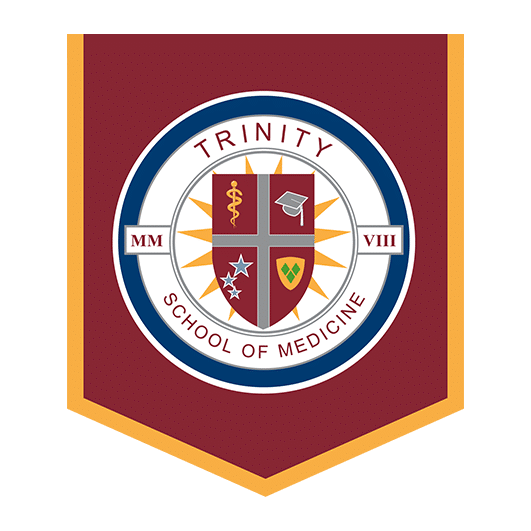After completing his undergraduate degree in Canada, at the University of Toronto, Dr. Jonah Hirshberg attended college to become a paramedic and later traveled with the Canadian military to Afghanistan, working alongside physicians and nurses. While working as a paramedic overseas, Dr. Jonah Hirshberg realized he wanted to do more. His dreams, along with his dedication and determination, allowed him to become what he once thought of as impossible, being a physician. Read more about Dr. Jonah Hirshberg and how Trinity School of Medicine became his choice for medical school.
What made you want to go into medicine?
I thought about being a doctor when I started undergrad. That dream faded as my GPA was not very good and I just felt like there was no way I would get in. I went to college to become a paramedic after finishing my undergraduate degree. I really enjoyed being a paramedic and it provided an amazing experience. Then while I was in Afghanistan with the military working with a group of incredible physicians and nurses, I wanted to do more. I wanted to increase my scope and understanding. When I returned from overseas, I went back to school part-time to improve my GPA and pursue getting into medicine.
What’s your academic background?
I initially finished a BA from U of T. Then I went to college and finished the Paramedic program. I worked full time eventually completing the Advanced Care Paramedic program. When I returned from Afghanistan, I returned to U of T part-time to complete my Honours degree with a triple minor in psychology, history, and physiology.
What brought you to Trinity?
After applying to schools in Ontario and not getting in. Going to an international medical seemed my only option. After researching different schools and programs, and reaching out to some current students, Trinity seemed to fit a balance of what I was looking for. Class sizes were small compared to some of the other bigger schools, there seemed to be a close connection with faculty and that faculty came from well-recognized institutions (when I attended in 2012-2014).
What ultimately helped you make the decision?
Class size ultimately for me was the deciding factor. At the time Trinity classes were quite small, though they have grown since. I still think they are smaller than many other schools in The Caribbean. This affords a closer connection with both your peers and faculty. It also allows for the unique clinical exposure that Trinity offered when I attended.
St. Vincent is a big transition from Canada. How was it?
Everyone is different in how they adjust. St. Vincent is a lovely country with friendly people and natural beauty. It is a small country with limited resources and as such expectations need to be set. My wife and I made friends with many locals where we purchased produce and groceries from. Public transportation, food supplies, etc are something to get used to but manageable. I encourage you to explore, buy local produce, fish and explore the island and its culture. The weather is great and the food is delicious!
Any particular memories of your time at Trinity?
It is more of a collection of people and places. Playing ball hockey on the basketball court, the catamaran trips after exams and my weekly trips to town for groceries. My fish guy Esworth, my coal lady, Sydney the butcher. Hiking the volcano was great, waterfalls, and Macaroni beach on Mustique. Travelling the US and Canada for clerkships and electives. My first son was born my third year. It is impossible to pick one event but a collection of important events and fun adventures.
Where did you match?
I initially matched to core internal medicine in Winnipeg at the University of Manitoba but switched to anesthesiology here at U of M.
What drew you to your specialty?
Internal medicine is a fascinating specialty that leads into all the subspecialties. It is very diverse in the pathology and approaches to problems that you will see, especially here in Manitoba. Internal medicine is one of the vital foundations for being a solid physician. Changing to anesthesiology was more because I enjoyed the balance of being in the operating room and applying physiology and pharmacology in real-time. It connects all the things I enjoyed about medicine with surgery.
Are you working on any research projects?
Many residency programs require a research project be completed. I am working on a project that is looking at the effect of transport time on mortality for interfacility transfers of critically ill patients via the air ambulance service.
Any specific advice for Canadians looking to head back home?
Apply broadly to both Canada and US. As an IMG it is incredibly competitive, and the reality is that there are substantial more positions available in the US. Certainly, there are hurdles with visa applications but most people I know have not had major issues in that regard. Getting a residency should be your ultimate goal. Do not limit yourself geographically. Once you get into a residency start researching what steps you will need to return to Canada. Generally speaking, as long as you complete all your exams, both Canadian and/or US, you will be in a good position to work on either side of the border.
How is life as an IMG in Canada?
It is fine. Very rarely do people care where you went to school. Do not wear it as a chip on your shoulder as some do. There are many IMGs who are amazing and capable physicians. Work hard, do right for your patients and yourself. Your merit as a physician has more to do with YOU as a person then where you went to school.
Do you have any advice for current or future Trinity students?
I am sure things have changed in the six years since I left the Island and finished school but ultimately this is your journey and you will get out of it what you put in. While in school study hard, and learn as much as you can to prepare both clinically and for exams. You need to get good grades and scores to be competitive. During clerkships treat every rotation like that is your chosen career. You will get more out
of it both educationally as well as important reference letters. Seek out good clinical experiences even if it means moving around a bit. Get those important audition electives. Electives with affiliated residency programs or at least with affiliated faculty mean a lot and for sure got me interviews I may not have otherwise had. Finally, apply broadly, do not limit yourself geographically, and go to as many interviews as you can arrange and afford. With all that, try to have fun too!

